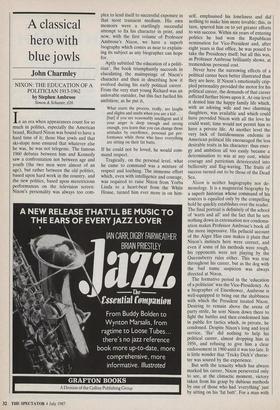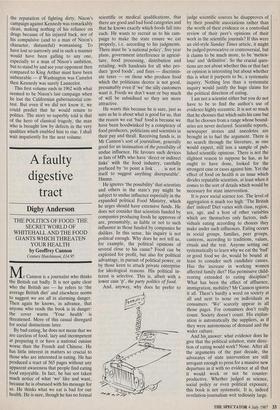A classical hero with blue jowls
John Charmley NIXON: THE EDUCATION OF A POLITICIAN 1913-1962 by Stephen Ambrose
Simon & Schuster, £16
In an era when appearances count for so much in politics, especially the American brand, Richard Nixon was bound to have a hard time of it; those blue jowls and that ski-slope nose ensured that whatever else he was, he was not telegenic. The famous 1960 debates between him and Kennedy saw a confrontation not between age and youth (the two men were almost of an age), but rather between the old politics, based upon hard work in the country, and the new politics, based upon meretricious performances on the television screen: Nixon's personality was always too corn- plex to lend itself to successful exposure in that most transient medium. His own memoirs were a startlingly successful attempt to fix his character in print, and now, with the first volume of Professor Ambrose's Nixon, we have a superb biography which comes as near to explain- ing its subject as any biographer can hope for.
Aptly subtitled 'the education of a politi- cian', the book triumphantly succeeds in elucidating the mainsprings of Nixon's character and then in describing how it evolved during his early political career. From the very start young Richard was an unlovable outsider, but this fact fuelled his ambition; as he put it,
What starts the process, really, are laughs and slights and snubs when you are a kid . . . [but] if you are reasonably intelligent and if your anger is deep enough and strong enough, you learn that you can change those attitudes by excellence, personal gut per- formance while those who have everything are sitting on their fat butts.
If he could not be loved, he would com- mand respect.
Tragically, on the personal level, what he came to command was a mixture of respect and loathing. The immense effort which, even with intelligence and courage, was required to raise Nixon from Yorba Linda to a heart-beat from the White House, turned him ever more in on him- self, emphasised his loneliness and did nothing to make him more lovable; this, in turn, spurred him on to yet greater efforts to win success. Within six years of entering politics he had won the Republican nomination for Vice-President and, after eight years in that office, he was poised to take the Presidency itself; but all this was, as Professor Ambrose brilliantly shows, at tremendous personal cost.
Never have the narrowing effects of a political career been better illustrated than they are here. If Nixon's emotionally crip- pled personality provided the motor for his political career, the demands of that career inflicted further blows upon it. At one level it denied him the happy family life which, with an adoring wife and two charming daughters, was available and which could have provided Nixon with all the love he could want; time would not permit him to have a private life. At another level the very lack of fastidiousness endemic in American political life encouraged the less desirable traits in his character: thus ener- gy and ambition all too easily became a determination to win at any cost, whilst courage and patriotism deteriorated into bellicosity and flag-waving. The fruits of success turned out to be those of the Dead Sea.
Nixon is neither hagiography nor de- monology. It is a magisterial biography by a superb historian whose command of his sources is equalled only by the compelling hold he quickly establishes over the reader.
The final portrait is definitely of the school of 'warts and all' and the fact that he sets nothing down in extenuation nor condemn- ation makes Professor Ambrose's book all the more impressive. His pellucid account of the Alger Hiss case makes it plain that Nixon's instincts here were correct, and even if some of his methods were rough, his opponents were not playing by the Queensberry rules either. This was true throughout his career, but as the dog with the bad name suspicion was always directed at Nixon.
The formative period in the 'education of a politician' was the Vice-Presidency. As a biographer of Eisenhower, Ambrose is well-equipped to bring out the shabbiness with which the President treated Nixon.
Desiring to remain above the arena of party strife, he sent Nixon down there to fight the battles and then condemned him in public for tactics which, in private, he condoned. Despite Nixon's long and loyal service, 'Ike' did nothing to help his political career, almost dropping him in 1956, and refusing to give him a clear endorsement in 1960 until it was too late. It is little wonder that 'Tricky Dick's' charac- ter was soured by the experience.
But with the tenacity which has always marked his career, Nixon persevered only to see, at the climactic moment, victory taken from his grasp by dubious methods by one of those who had 'everything' just by sitting on his 'fat butt'. For a man with the reputation of fighting dirty, Nixon's campaign against Kennedy was remarkably clean, making nothing of his reliance on drugs because of his injured back, nor of his compulsive (and to a man of Nixon's character, distasteful) womanising. To have lost so narrowly and in such a manner would have been galling to any one, especially to a man of Nixon's ambition, but to stand by and see your opponent then compared to King Arthur must have been unbearable — if Washington was Camelot then Kennedy was surely Launcelot.
This first volume ends in 1962 with what seemed to be Nixon's last campaign when he lost the Californian gubernatorial con- test. But even if we did not know it, we could predict that he would return to politics. The story so superbly told is that of the hero of classical tragedy, the man who is brought low by defects in the very qualities which enabled him to rise. I shall wait impatiently for the next volume.



















































 Previous page
Previous page